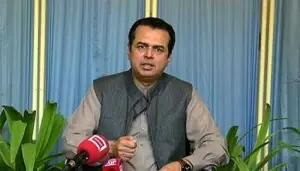No role in no-confidence motion against PM, election proceedings: ECP
3 min readA day after Prime Minister Imran Khan demanded of the Election Commission of Pakistan (ECP) to take notice of alleged horse-trading related to no-confidence motion against him, the electoral body on Thursday, distanced itself from this issue, saying, it has no role in the matter.
“The ECP has been subjected to criticism from senior government functionaries in the context of alleged floor-crossing by some members against the backdrop of no-confidence motion moved against the PM”, the commission said in a statement.
“In the light of relevant constitutional and electoral provisions as well as the related rules of business — it is clarified that ECP has no role in the proceedings of the election of, and no-confidence motion against the PM”, it added.
The ECP said it can play a role in the proceedings related to election of PM and no-confidence motion if empowered to do so through parliamentary legislation.
“The ECP is well aware of its powers and is exercising them effectively”, the electoral body said.
Addressing a public rally in Swat earlier on Wednesday, the PM had accused opposition parties of engaging into horse-trading in the Sindh House and demanded of ECP to take notice.
According to Article 95: (1) A resolution for a vote of no-confidence moved by not less than twenty per cent of the total membership of the National Assembly may be passed against the PM by the NA.
(2) A resolution - shall not be voted upon before the expiration of three days, or later than seven days, from the day on which such resolution is moved in the NA.
(3) A resolution referred – shall not be moved in the NA while the NA is considering demands for grants submitted to it in the annual budget statement.
(4) If the resolution referred – is passed by a majority of the total membership of the NA, the PM shall cease to hold office.
The ECP can only play its role if any lawmaker votes against his/her party’s policy in the no-confidence motion and their case is referred to the electoral body.
Article 63 A (b) provides that — if a member of a parliamentary party composed of a single political party in a house - votes or abstains from voting in the house contrary to any direction issued by the parliamentary party to which he belongs, in relations to - election of the PM or the chief minister; or a vote of confidence or a vote of no-confidence; or a money bill; he may be declared in writing by the head of the parliamentary party to have defected from the political party, and the head of the parliamentary party may forward a copy of the declaration to the presiding officer, and shall similarly forward a copy to the member concerned: Provided that before making the declaration, the head of the parliamentary party shall provide such member with an opportunity to show cause as to why such declaration may not be made against him.
Article 63 A (2) says a member of a house shall be deemed to be a member of a parliamentary party, if, he, having been elected as a candidate or nominee of a political party – by means of a declaration in writing.
Article 63 A (3) provides that upon receipt of the declaration – the presiding officer of the house shall within two days refer the declaration to the chief election commissioner who shall lay the declaration before the election commission for its decision confirming the declaration or otherwise within 30 days of its receipt by the CEC.
The story was originally published in Business Recorder on March 18, 2022.
For the latest news, follow us on Twitter @Aaj_Urdu. We are also on Facebook, Instagram and YouTube.





















Comments are closed on this story.